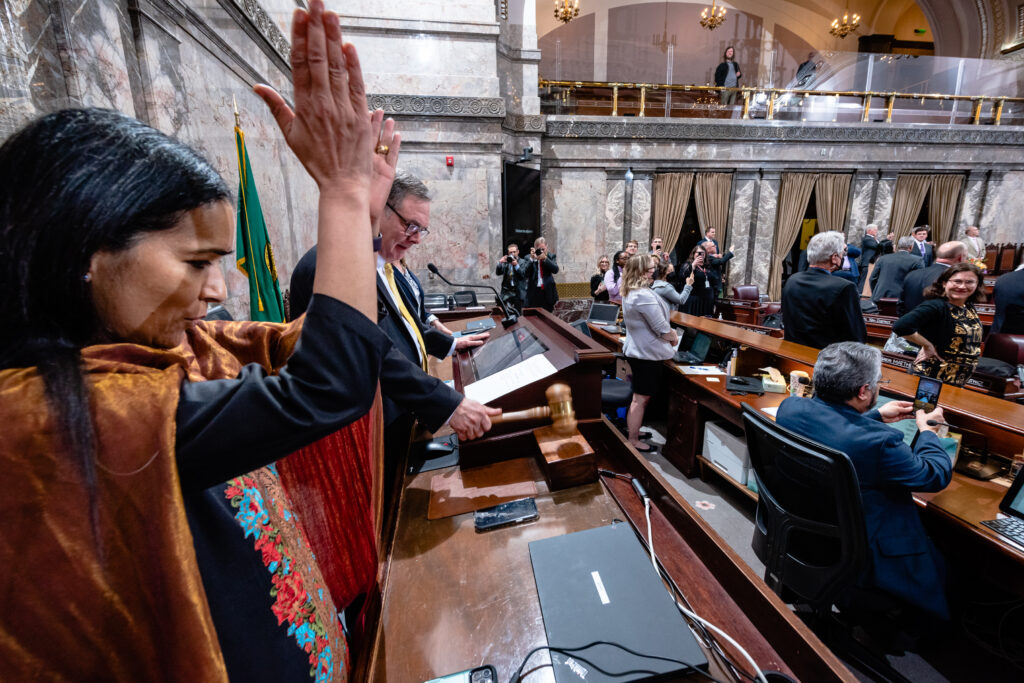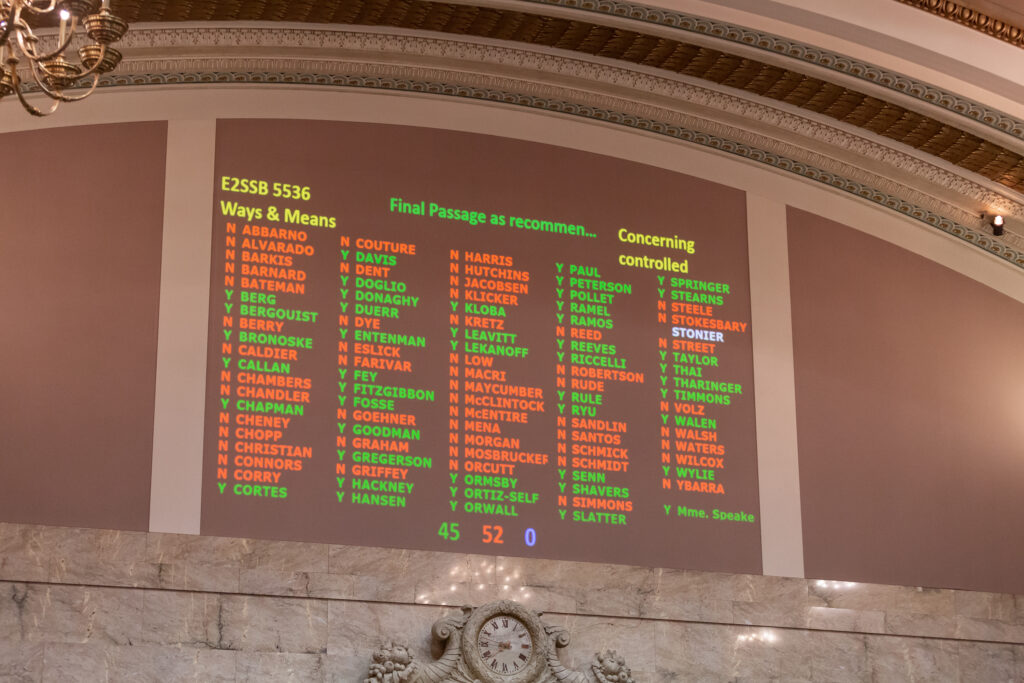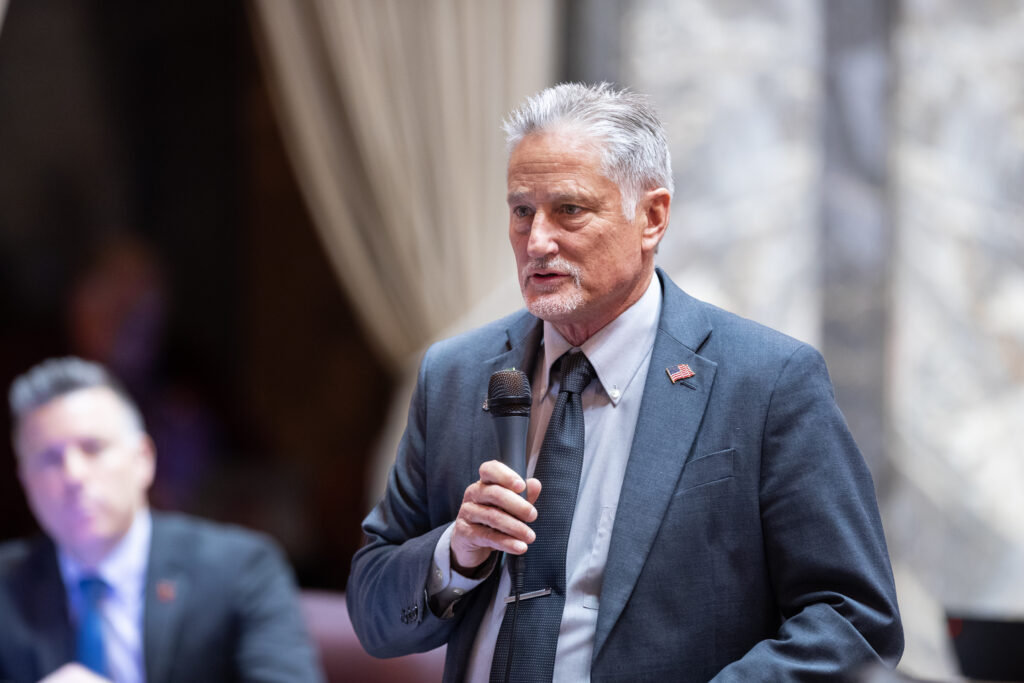Legislature’s big debate about public safety to continue when lawmakers return May 16
Note: The following e-newsletter was sent to Sen. Wilson’s subscribers May 2, 2023. To subscribe to Sen. Wilson’s e-newsletters, click here.

The Washington Legislature ended its 105-day regular session April 23. Above, Lt. Gov. Denny Heck raps the final gavel in the Senate.
So soon after we put Olympia in the rear-view mirror, the Washington Legislature is getting set to return. We adjourned our 2023 legislative session a little over a week ago, but lawmakers learned late this afternoon that we are being called back to the Capitol to finish a job that was botched in the session’s final hours. We need to pass a bill restoring penalties for hard drugs.
There’s no good excuse for this special session. The issues are clear and the answers are obvious. Our current law is weak. It also expires June 30, 2023. If we don’t pass a new law, we will have no law on the books against possession of heroin, fentanyl and other deadly substances. We should have settled this weeks ago.
This debate is really a continuation of the Legislature’s big arguments this year about public safety. Two years ago, our colleagues responded to unrest in Seattle and other major cities by passing laws to weaken the hand of law enforcement. This year offered a test for our Democratic colleagues, who hold the majorities in the House and Senate. Would they be able to set ideology aside, recognize the critical role that law enforcement plays in our society, and restore the laws they gutted two years ago?
The job proved more difficult than it should have been, and while we made some headway this year, our biggest debates are still to come. In this upcoming special session, I hope the Legislature will be able to face hard truths about drugs and crime, and the need for effective law enforcement. I stand ready to vote with Republicans for a tough, compassionate and enforceable drug law that will give police and prosecutors the tools they need to get addicts into treatment. We know what works and what doesn’t. This special session will give lawmakers another chance.
Public safety proves session’s biggest issue
Lawmakers debate pursuit law, drugs, gun restrictions

After 105 days of debate, the House finally took a vote on this year’s “Blake fix” bill — and came up short. The final tally was 55-43.
The last-minute failure of this year’s drug bill in the state House April 23 was the signature event of a session that focused on public safety. It was the final day of the session, and the House could put off a vote on the bill no longer. Unfortunately, the weak compromise Democratic leaders came up with pleased no one, and in an unusual vote on the House floor, the bill failed 55-43. It was one of several debates this year on public safety issues that ended in a disappointing way.
Drug policy is an issue because of a state Supreme Court ruling overturning our old felony statutes two years ago, in a case called State v. Blake. Rather than fixing our old law, our majority colleagues took the opportunity to express frustration with the war on drugs by making possession a barely enforceable misdemeanor. Cops have given up. Overdose deaths have doubled since 2020, to 2,500 last year. The state Department of Health tells us overdoses are now the leading cause of death in men under age 60.
This year I joined Republicans and responsible Democrats in the Senate in supporting a bill that carves out a role for law enforcement. Despite great resistance, we managed to pass a measure giving police and prosecutors additional authority to compel addicts to participate in treatment programs. Unfortunately, a hard-line faction in the House insisted on weakening the bill for ideological reasons – leading to the failed last-minute vote. Let’s hope the majority is able to get its priorities straight in the coming special session.
On police pursuit, we made a half-step toward progress. Legislation two years ago banned most police pursuits, and the results again were predictable. Crime rates skyrocketed. Car theft is up 50 percent. Criminal driveaways have tripled. This year, we were able to restore pursuits for most violent crimes. However, police still must stand down in non-violent crimes, such as reckless driving and vehicle theft. I voted for this bill because a half-solution is better than none, but we will need to revisit this issue next year.
On Second Amendment rights, we saw the deepest disagreements of the session. All of us deplore violence, but the emotional responses we saw from our colleagues do nothing to address the problem. They passed laws banning the sale of certain semiautomatics and modern sporting rifles, require firearms purchasers to complete state-approved gun safety courses, and allow the attorney general to sue when firearms are used in crimes. Legal challenges were immediate when these bills were signed into law last week. The sad truth is that even if these laws stand, they will not prevent violence, and we will be back again next year debating a new round of anti-gun measures. To address root causes, we need to consider mental and behavioral issues, and our responsibility to intervene before violence occurs – a much more difficult task.
Session’s highs and lows
On housing policy, Democrats and Republicans worked together, passing laws that will streamline permit processes, increase high-density development, and make it easier for homeowners to develop accessory dwelling units on their property. Unfortunately, these efforts to increase affordable housing were counterbalanced by a costly new measure requiring land-use policies to be designed around climate change. The Legislature needs to get its messages straight.
Local projects funded by the Legislature this year include a $72 million railway grade separation project in Aberdeen, to unsnarl traffic congestion surrounding the Olympic Gateway Plaza. Others include a $575,000 roof repair at the Kelso train depot, $3.5 million for port expansion at Aberdeen, $14 million to renovate hatcheries at Naselle and Beaver Creek, and funding for parks, playgrounds and libraries. To see the full list, click here.
Four bills I sponsored made it to the governor’s desk. Two have already been signed into law, a safety measure prompted by the tragic deaths of two tow-truck operators in Southwest Washington, and a bill aimed at preventing vandalism to electric vehicle charging stations. Others awaiting the governor’s signature launch a study of recycling wind-turbine blades and enable firearms transfers to museums.
My biggest disappointment this session was the failure of a bill I sponsored to crack down on catalytic converter theft. To tackle organized theft rings, we proposed a license requirement for purchasers of five or more used catalytic converters. During the final days of the session, the bill’s progress was stopped by industry opposition, and we will need to resume the effort next year. In a major irony – just as the bill was faltering in Olympia, news reports from central Washington revealed the existence of an organized theft ring based in the Tri-Cities and Moses Lake, calling attention to the need for stronger laws.
In the news:
Washington lawmakers say tough luck to victims of catalytic converter theft
The following editorial appeared in the Seattle Times April 17 following the defeat of my catalytic converter bill, SB 5740. This year I worked closely with King County Deputy Prosecutor Gary Ermsdorff and other players in developing a proposal. This year’s inaction was a disappointment – but we’ll be ready to hit the ground running next year.
The Seattle Times editorial board
No doubt state lawmakers will be congratulating themselves for all the things they accomplished this session. But tens of thousands of Washingtonians will be cursing them for their irresponsible indolence.
That’s how many people will be affected directly and indirectly by the scourge of catalytic converter theft. For days, no way to get to work, get kids to school or soccer, paying deductibles for repairs and, possibly, all of us paying higher premiums.
A much-needed catalytic converter bill would seem like a no-brainer. There was even a set of recommendations laid out in a report that legislators ordered to be completed last year.
But unless there’s the parliamentary equivalent of a last-ditch effort, folks are expected to leave Olympia on Monday without trying to reduce this persistent and costly crime. This would be an unacceptable dereliction of duty.
As part of the Legislature-ordered study, 23 law enforcement agencies across the state found more than 8,000 police reports were filed on catalytic converter theft from January to August last year. When the final numbers for the year are tallied, they are expected to match or exceed the more than 12,000 reported thefts for all of 2021.
(To continue reading, click here.)
________________________________________
Thanks for reading — it is an honor serving you.
Sen. Jeff Wilson
19th Legislative District
________________________________________
Contact me!
Telephone: (360) 786-7636
Email: Jeff.Wilson@leg.wa.gov
Mailing address: P.O. Box 40419 /Olympia, WA 98504
Leave a message on the Legislative Hotline: 1-800-562-6000
To unsubscribe from these regular updates from Olympia, go to the Subscriber Preferences Page below.













